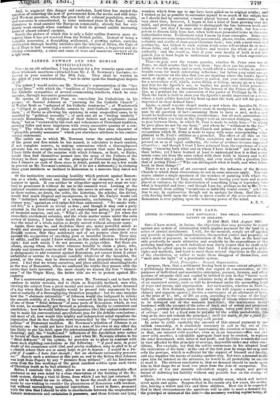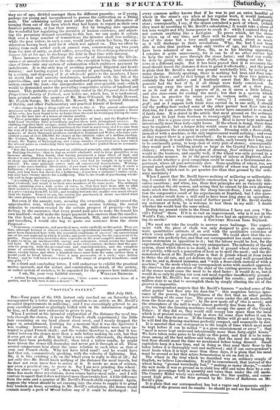THE LAND.
LETTER I1.--FREEHOLD LIFE ASSURANCE : THE SMALL PROPTITETOES-- • socirry OF IRELAND.
• • • 23 Pall Mall, 13th August SIR—I have stated, in limine, the objections that may probably-be urged - against any system of colonization which implies payment for the land by a_ series of annual instalments. I will, for the moment, simply set off against any possible or impossible impediments, the manifest justice and propriety of sash a mode of payment, in consideration of the fact, that as the kind can only gradually be made attractive and available by the expenditure of then accruing land-fund, so each individual may fairly expert that he shall only gradually be called upon to create that fund. I will at once proceed to prin- ciples and methods, and trust to meet those several objections the'qourse of the elucidation, or rather to make them disappear of themselves, and. ".melt iato the light." of a practicable system. .
First, Principles : Second, Organization. .
I propose, then, that a eettle,ment having been to some etefit ridapteil; liv aspreinvinary investment, made with tine regard tie concentration - to tare purposes of individual and associative enterprise, yeonren, farmers, aL‘a, Miter persons of adequate -skill and capital be iirrited to join in this "heroic work of plantation" : these yeomen or colonists being at the same time members of an organized society, such as will be developed under the succeeding -heads of ways and means, and organization. Let each settler, whether in Norfolk, Galway, or New Zealand, (only that each site will require a separate ma- chinery and separate agency,) receive a conveyance of an allotment of lund,, at the prism of 1/., 104 or 201. an acre, according to the value of the q,d. with the estimated improvemente, (and 'supply of hibour where rieeessealva) to be defrayed nut of ithe common land-fund; the conveyance beittg". burdened with the amount of the-price of land; nul of genial. lied projeceed: outlay, a portion of thespirohaee-money, perhaps, being paid down Isyswur of salvage : and let a fixeil-s4n be payeNst-by the SAO& periodically, !taps long as he does Wit rideein the principal,)- tinld his rhieltA, or for a furee plc tied, contingently upon his surviving such period. In order to settle equitably the amount of this annual payment to es- tablish ownership, it is absolutely necessary to call in the aid of the seienoe that treats of the means of ascertaining the duration of human life ; so that, one 'colonist with another even as in an insurance-office one as• surer With another, a ealetdable aggregate fund may be created, to replace the total trivestinent, with- interest and profit, anil facilities towel& the end' in vies afforded by this ptiociple of:average, immiesible under-any other Por example, say that the settler commence& in his :adopted: land! the Cultivation of his farm ;,iit the: end of the first Year he vemis kris crop aid sells the produce, which is sufficient fin' the. support -of himself and franity, and alsotaipplies 'the means of raising another crop. But were adernend Maras upon him for interest on the advances, he would in all probability be-umilan to meet it. The Obvious conclusion is, that no demand should be made upon: him in That shape-for at least two years from the date of occupation. The ptinciples of life and annuity calculation supply a simple and partial means of deferring his liability without any possible loss on the average -of settlers.
Again, let us suppose a ease which may readily occur, which will indeed occur again and again. Suppose that in the course of a few years, the settler dies, leaving a widow and two and three children. How can it be expected. that in their circumstances the survivors will be able to meet a demand for the principal or intereatef the debt?—the necessary working capital being, if they are of age, divided amongst them for different pursuits ; or if young, perhaps too young and inexperienced to pursue the cultivation on a fitting scale. The colonizing society must either take the harsh alternative of turning them out of the farm which they had begun to regard as their own familiar patrimony, or lose their money. But by bringing into operation the wonderful law regulating the duration of human existence, and adjust- ing the pecuniary demand according to this law, we can make it certain that over a large number of transactions the invester shall lose nothing; -while the poor widow, in such a case, would justly retain her farm, the con- . sideration having been paid for it which was agreed on. This we effect by taking from each settler such an annual sum, commencing say, two years
• from the date of entry, as shall suffice, according to the ordinary duration of human life at his age, to discharge the debt in that time with interest.
These instances may illustrate the necessity of introducing the life-in- surance or annuity clement as the rule—the exception being the uninsurable class of lives—into any system of colonization which embraces payment by instalments. It is the only way of avoiding perpetual litigation and heart- :burning : and having regard to the economy of purchasing land wholesale by a society, and disposing of it at wholesale prices to the members, I have no doubt that such annuity instalments, terminable with the life of the -paterfamilias, and yet securing an unburdened patrimony to his heirs, will seldom exceed the rent—the unreproductive and ever-payable rent—which would be dethanded under the prevailing competitive system of landlord and tenant. This probable result is admirably stated in the Proposal for a Small Proprietors Society of Ireland, now before me, which has, it is understood, been printed under the auspices of Mr. More O'Ferrall, Sir Ralph Howard, Mr. Poulett &rope, Mr. Sadleir, Mr. Monsell, Mr. Duffy, several Aldermen of Dublin, and other Parliamentary and practical friends of Ireland. "It is cheaper to buy a thing right out than to hire it. The annual subscription necessary to be paid for about a dozen years to enable a member to acquire a house of his own, has been found to be no larger than the rent he would pay during the same time for the bare hire of a house of similar quality. " These principles apply equally to the purchase of land ; and the English Free- hold Land Societies have accordingly applied them with triumphant success. By clubbing together their savings, many thousand members have already become own- ers of small freeholds, and have purchased the land in most cases at a less sum than the rent of it for ten or twelve years would have amounted to. There are at present upwards of thirty thousand members enrolled in England and Wales, who have sub- scribed a sum of over 180,000/. for shares of the ultimate value of a million sterling. Mr. Cobden, Mr. Bright, Sir Joshua Walmsley, Mr. Milner Gibson, Lord Dudley Stuart, Mr. Taylor of Birmingham, and a large number of practical men, have taken the utmost pains in conducting their operations, and have guided them to a remark- able success.
"But the Land Societies developed an additional principle, only slightly operative -in Building Societies—that to buy an article wholesale and an large quantities is an immense -saving. They found, that having purchased a large block of land, and divided into allotments for their members, each man had his particular allotment at about one-third of the price it would have cost had he bought it by retail for himself. The same principle enters into all commercial transactions. Writing- paper is the most familiar illustration : if you want to buy a single sheet, it costs a halfpenny; if you buy a quire, you halve four sheets for a halfpenny ; if you buy a ream, you may have ten sheets for a halfpenny ; if you buy a stationer's entire stock, you may have twenty sheets for a halfpenny. This is the result of purchasing whole- sale and in large quantities.
" According1y, the vital principle of the Freehold Land Societies has been to buy land wholesale, and retail it to their own members at the same price. The ordinary result, spreading over a wide series of cases, is, that they have been able to allot their members a freehold, which would cost an individual purchaser from SOL to 701., at a price varying from 18/. to 251., and tending towards the smaller sum much oftener than the larger. That is to say, the society has purchased at about one-third what the same property would cost an individual."
But even if the annuity rent, securing the ownership, should exceed the unproductive rent, which never ceases, and secures nothing, the moral stimulus to exertion created by the certain prospect of property—by the feeling, by the assurance, that every pound paid goes to make the tenant his own landlord—would make the larger payment less onerous than the smaller. On this head, not to refer to Laing, Sismondi, Mill, and other economists and travellers, I would also beg to quote one sentence from the above Proposal- " Statesmen, economists, and practical men, unite cordially on this point. They see that, although Ireland is almost exclusively an agricultural country, agriculture has never been furnished here with the essential conditions of success—an unrestricted use of the raw material in which it works, and perfect security for the enjoyment of its profits. Proprietorship furnishes these requisites in the most complete manner. And it adds to them an inexhaustible energy and enterprise, which render the hardest toil light. M. Thiers, who saw the result in his own country, declares that the pas- sion for property, with the personal care and superintendence, and the complete sense of security which it begets, enables the small proprietor to produce ten times, twenty times, and often a hundred times more from the same surface than it would yield to hired labour. ' Give a man possession of a rock,' says Arthur Young, ' and he will turn it into a garden. The magic of property transforms sand into gold.'" •
In a third and concluding letter, I will endeavour to exhibit the practical modus operandi, and the nature and constitution, in detail, of the society, or rather system of societies, to be organized for the pa! poses here indicated.
• Arthur Young even affirms a converao, " Give a man a nine-years lease of a garden, and he will turn it into a desert."—W. B.



























 Previous page
Previous page